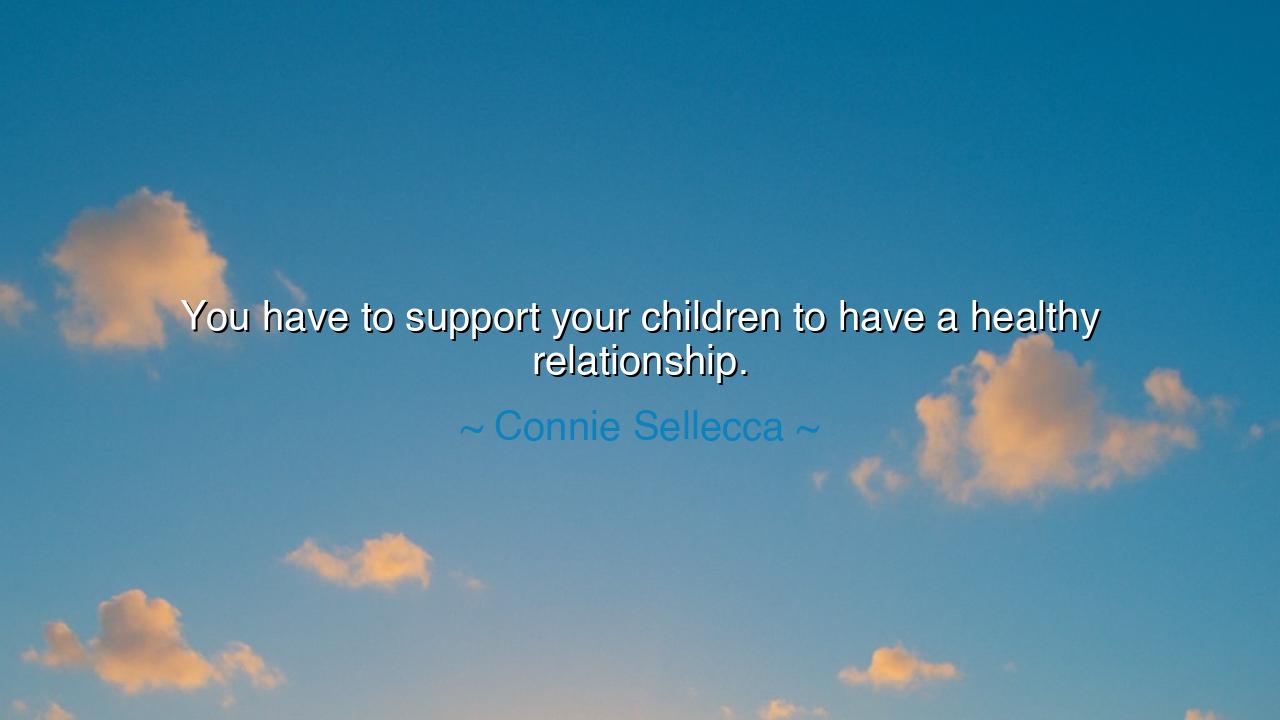
You have to support your children to have a healthy






The words of Connie Sellecca are simple yet profound: “You have to support your children to have a healthy relationship.” In this, she speaks a truth as ancient as the hearth itself—that the bond between parent and child is not forged by command or authority alone, but by the steady hand of support. To support your children is to give them roots strong enough to hold fast, and wings steady enough to fly. Without such support, even love can falter, and even the most well-meaning family may grow apart.
The ancients often compared the family to a tree. The parent is the trunk, firm and steady, while the child is the branch, delicate but growing. If the trunk does not nourish the branch with sap and shelter, the branch withers. So too with support—children cannot flourish if they are left unseen, unheard, or unencouraged. The trunk does not command the branch to grow; it feeds it, anchors it, and allows it to reach for the sun. This is the essence of a healthy relationship: a bond where guidance is balanced with encouragement, and authority is tempered with care.
History provides us with countless mirrors of this wisdom. Consider the life of Thomas Edison. As a boy, he was deemed slow and unteachable by his schoolmaster. Yet his mother refused to accept this judgment. She withdrew him from school and educated him at home, nurturing his curiosity rather than stifling it. Her unwavering support gave Edison the confidence to pursue the questions that would one day light the world. Without her encouragement, his genius might have been extinguished by doubt. Here, we see Sellecca’s truth embodied: support is the soil from which greatness grows, and it is the foundation of trust between parent and child.
To support your children is not to indulge every whim, nor to shield them from every hardship. It is to walk beside them as they stumble, to encourage when they doubt, and to remind them of their worth when the world forgets it. This support is not passive—it is active, requiring presence, patience, and sacrifice. A healthy relationship is built not in grand speeches but in daily acts: listening to their fears, celebrating their victories, and standing firm when storms arise.
Sellecca’s words also challenge us to see that without support, relationships become strained. A child left without encouragement may grow resentful, distant, or fearful. A parent who withholds support may find their authority rejected and their guidance ignored. But when a parent offers genuine support—seeing the child’s individuality, honoring their dreams—the bond deepens. Respect grows on both sides, and the relationship endures across generations.
The lesson here is clear: if you wish to build a lasting and healthy relationship with your children, begin with support. Be the steady voice that tells them they are capable. Be the safe harbor where they may return after failure. Be the anchor that steadies them as they face life’s storms. For in your support lies their strength, and in their strength lies the bond that will carry your relationship through the years.
Practically, this means making time to listen, not just to speak. It means noticing their efforts, not only their results. It means encouraging their passions, even when they differ from your own. And it means offering patience, for children do not grow in straight lines but in winding paths. By supporting them in these ways, you give them not only confidence but also the assurance that your love is steady and enduring.
Thus, Connie Sellecca’s words stand as both truth and command: “You have to support your children to have a healthy relationship.” This is the foundation of trust, the wellspring of resilience, and the path by which parents and children walk together—not in chains of authority alone, but in the bond of encouragement and love. It is in this support that families thrive, and in this support that generations are healed and made whole.






AAdministratorAdministrator
Welcome, honored guests. Please leave a comment, we will respond soon